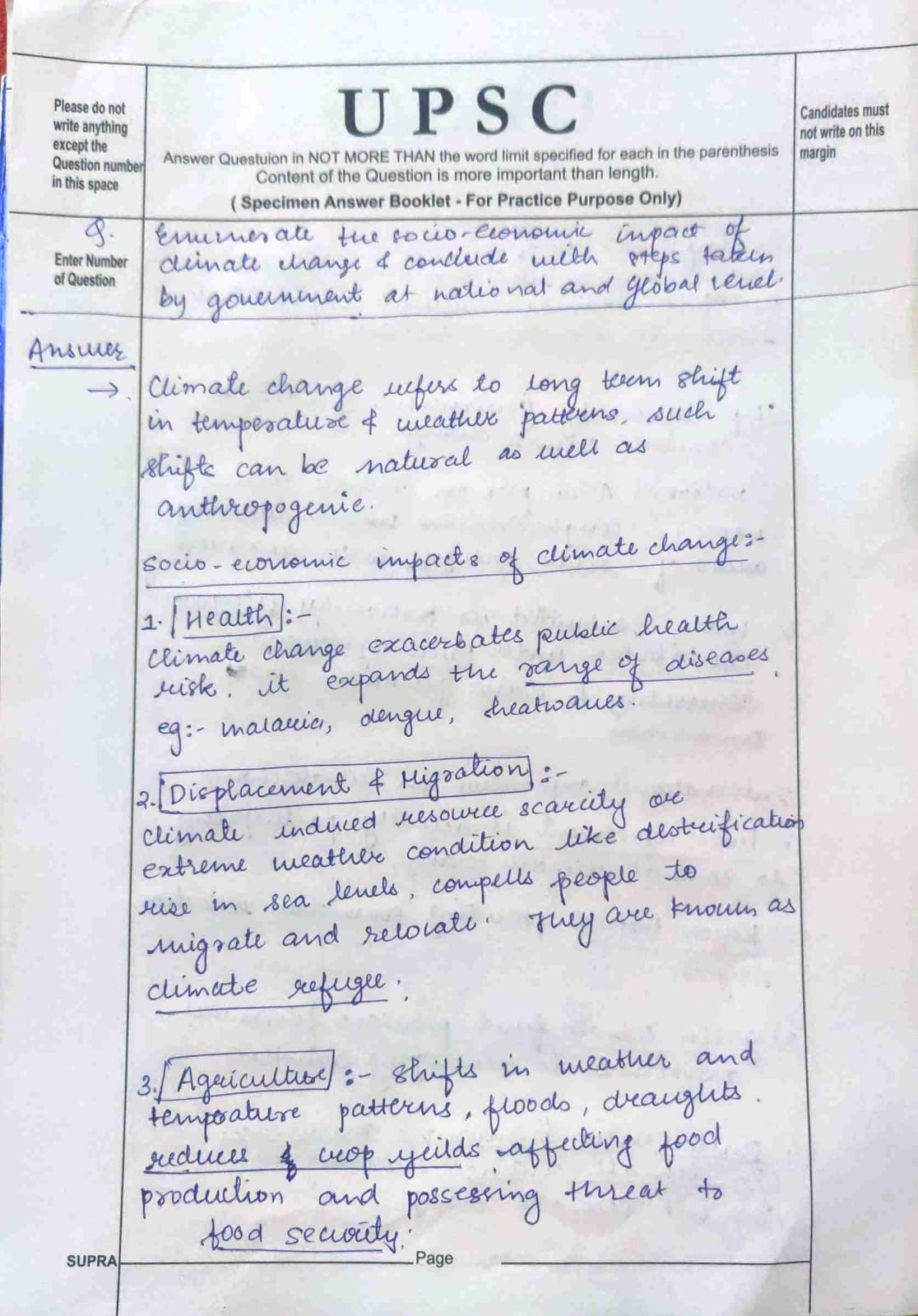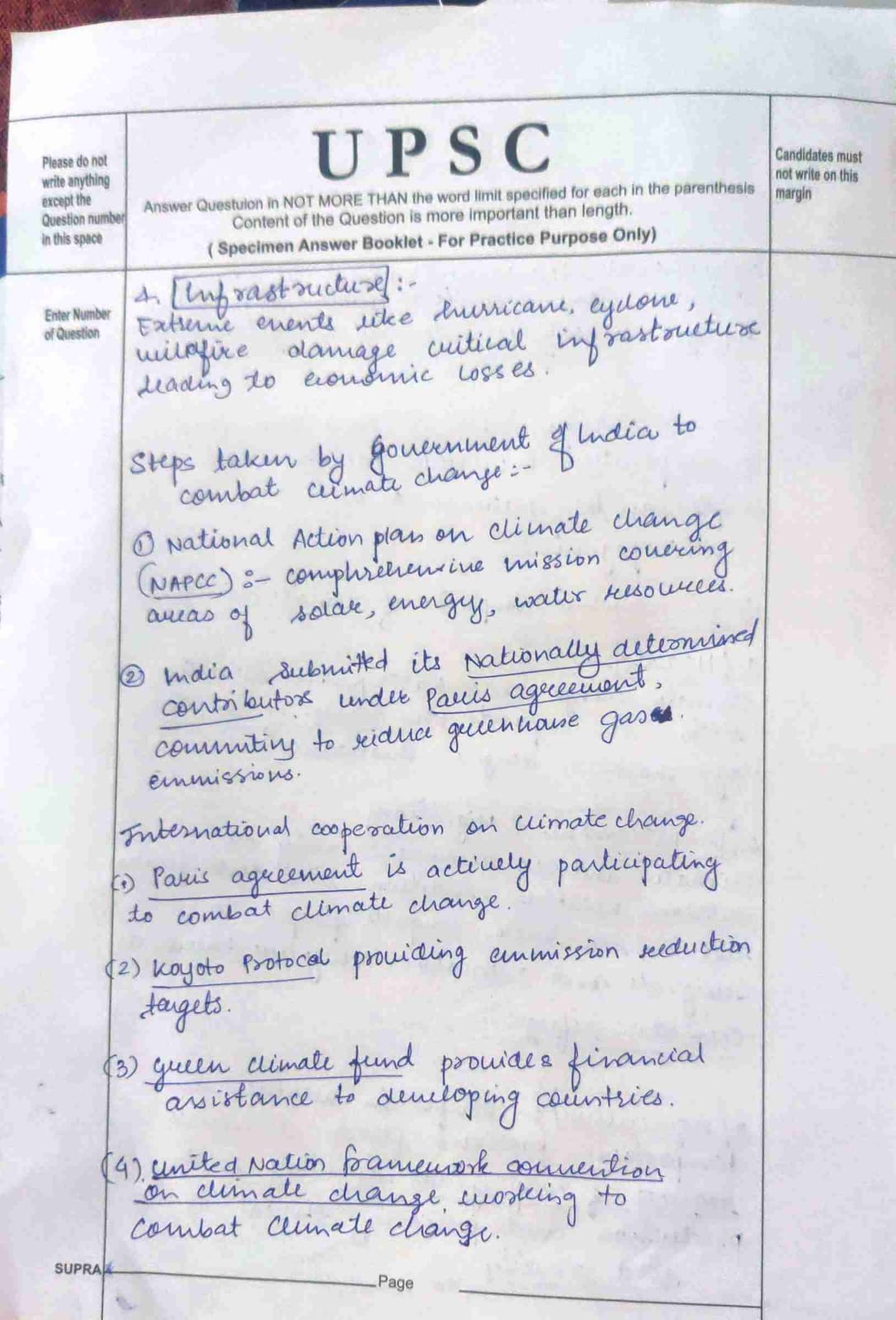Home/Biodiversity & Environment/Page 8
Biodiversity & Environment
Share
335 Followers
139 Answers
598 Questions
Resources & Suggestions
Mains Answer Writing Latest Articles
On: April 18, 2025
Daily Answer Writing Practice Questions (18 April 2025)
Do you agree with the claim that indecision and risk aversion are prevalent issues in Indian bureaucracy? Support your answer with logical reasoning. (150 words) ऐसा कहा जाता है कि भारतीय नौकरशाही में अनिर्णय और जोखिम से बचने की प्रवृत्ति ...
On: April 18, 2025
Comments:
0
Strengthening India’s Cyber Defence
Rising Threats Digital Era Challenges: 2024 marks a significant rise in digital threats, particularly from AI and cyberattacks. Key Issues: Disinformation campaigns. Cyber fraud affecting daily life. Current Major Cyber Threats Ransomware Rampage: Over 48,000 instances of WannaCry ransomware detected ...
On: April 18, 2025
Comments:
0
भारत की साइबर सुरक्षा
बढ़ते खतरे कृत्रिम बुद्धिमत्ता (AI) और साइबर हमले: 2024 में AI और साइबर हमलों के खतरे में वृद्धि। महत्वपूर्ण अवसंरचना पर हमले: डिजिटल हमलों और दुष्प्रचार अभियानों की संभावना बढ़ी है। प्रमुख साइबर खतरें रैनसमवेयर का प्रकोप: 48,000 से अधिक ...

Explain the Feminism.
"Feminist" are terms that assert women's rights, their dignity, and encouragement of violence free society. They make people question those stigmas, advocate for equal rights for women, and equality. Some examples of these words include Empowerment, equality, equity, and choice of all genders. A femRead more
“Feminist” are terms that assert women’s rights, their dignity, and encouragement of violence free society. They make people question those stigmas, advocate for equal rights for women, and equality. Some examples of these words include Empowerment, equality, equity, and choice of all genders.
A feminist is one who, be man or woman, has faith in and advocates the cause of women/womankind. Feminist endeavors to remove prejudice in society, equity in the workplace and at school and respect the person’s decision. They firmly stand for changes in gender stereotype and support equal rights, duties, and chances for both men and women.
See lessExplain the Feminism.
Feminism is a movement that fights for equal rights and opportunities for women , challenging unfair gender norms and stereotypes to create a fair and equal society for all. India's feminist landscape shows mixed progress i.e. 68.3% female literacy, 27% workforce participation and 14% female parliamRead more
Feminism is a movement that fights for equal rights and opportunities for women , challenging unfair gender norms and stereotypes to create a fair and equal society for all.
India’s feminist landscape shows mixed progress i.e. 68.3% female literacy, 27% workforce participation and 14% female parliamentarians yet 30% domestic violence and 110:100 sex ratio imbalance persist.
Impact of Feminism –
Feminism faces challenges from societal norms, patriarchal mindsets and gender stereotypes plus obstacles like lack of resources, political resistance, internal divisions and online misogyny. Additionally, intersectionality issues, cultural barriers and economic disparities hinder progress toward true gender equality and inclusivity for all women.
See lessEnumerate the Socio-economic impact of climate change and Conclude with steps taken by government at national and global level.
*Socio-Economic Impacts of Climate Change:* 1. Health: Increased disease spread, heat stress, and mental health issues. 2. Food Security: Crop failures, water scarcity, and changed weather patterns. 3. Economic Growth: Losses in agriculture, infrastructure, and tourism. 4. Human Migration: DisplacemRead more
*Socio-Economic Impacts of Climate Change:*
1. Health: Increased disease spread, heat stress, and mental health issues.
2. Food Security: Crop failures, water scarcity, and changed weather patterns.
3. Economic Growth: Losses in agriculture, infrastructure, and tourism.
4. Human Migration: Displacement due to sea-level rise, droughts, and floods.
5. Social Inequality: Unequal distribution of climate impacts and resources.
6. Water Scarcity: Changes in precipitation patterns and increased evaporation.
7. Energy Security: Impacts on renewable energy sources and grid resilience.
8. Cultural Heritage: Loss of traditional livelihoods and cultural identity.
*National Level Initiatives (India):*
1. National Action Plan on Climate Change (NAPCC)
2. National Clean Energy and Environment Fund (NCEEF)
3. Renewable Energy Targets (175 GW by 2022)
4. Electric Vehicle Policy
5. Green India Mission
*Global Level Initiatives:*
1. Paris Agreement (2015)
2. United Nations Framework Convention on Climate Change (UNFCCC)
3. Sustainable Development Goals (SDGs)
4. Intergovernmental Panel on Climate Change (IPCC)
5. Climate and Clean Air Coalition (CCAC)
*Key Steps:*
1. Reduce greenhouse gas emissions
2. Promote renewable energy
3. Enhance energy efficiency
4. Protect and restore natural ecosystems
5. Support climate-resilient infrastructure
6. Encourage sustainable agriculture practices
7. Foster international cooperation and climate governance
*Way Forward:*
1. Implement policies and regulations
2. Increase public awareness and education
3. Encourage private sector investment
4. Develop climate-resilient technologies
5. Strengthen global partnerships and cooperation.
Mitigating climate change requires collective action, and governments, businesses, and individuals must work together to address this global challenge.
See lessWhat are the most effective strategies to reduce greenhouse gas emissions and mitigate the impacts of climate change?
Greenhouse gas emissions (GHGs) are gases released into the atmosphere, trapping heat and contributing to global warming and climate change.example- carbon dioxide, methane etc. India's greenhouse gas emissions total 3.3 billion tons ( ranking 5th globally ) i.e.Energy (60%), Industry (21%), AgriculRead more
Greenhouse gas emissions (GHGs) are gases released into the atmosphere, trapping heat and contributing to global warming and climate change.example- carbon dioxide, methane etc.
India’s greenhouse gas emissions total 3.3 billion tons ( ranking 5th globally ) i.e.Energy (60%), Industry (21%), Agriculture (14%) and Waste (5%). India aims to reduce emissions by 33 to 35% by 2030.
Effective strategies to reduce Greenhouse gas emissions and it’s impact on climate change –
Reducing greenhouse gases requires collective action through renewable energy, energy efficiency, sustainable practices and conservation. Together we can mitigate climate change, protect the planet and ensure a healthier future.
See lessEnumerate the Socio-economic impact of climate change and Conclude with steps taken by government at national and global level.



See lessWhat is the most efficient way to reduce climate change
Today climate change is the most important issue the globe is facing which needs to be discussed at the earliest.There are several ways by which we can overcome climate change:- 1.limitising the carbon emission by controlling vehicular and industrial pollution. 2.Proper urbanisation facility and poRead more
Today climate change is the most important issue the globe is facing which needs to be discussed at the earliest.There are several ways by which we can overcome climate change:-
1.limitising the carbon emission by controlling vehicular and industrial pollution.
2.Proper urbanisation facility and population control methods.
3.Avoiding the use of hybrid food materials 4. Selection of proper area for waste disposal.
5.Afforestation.
6.Use of less electricity and electronics components.
These are the various ways by which we can overcome climate change.
See lessWhat is meant by biodiversity conservation? What efforts have been made at the National level in this regard?
Biodiversity Conservation: Concept and National Efforts Introduction Biodiversity conservation refers to the practice of protecting and maintaining the variety of life on Earth, including ecosystems, species, and genetic diversity. This involves managing and preserving the natural environment to ensRead more
Biodiversity Conservation: Concept and National Efforts
Introduction Biodiversity conservation refers to the practice of protecting and maintaining the variety of life on Earth, including ecosystems, species, and genetic diversity. This involves managing and preserving the natural environment to ensure that biodiversity remains stable and resilient, thereby supporting ecosystem functions and services crucial for human well-being.
Concept of Biodiversity Conservation
National Efforts in Biodiversity Conservation
Challenges and Future Directions
Conclusion
Biodiversity conservation is crucial for maintaining the health and functionality of ecosystems and supporting human life. National efforts in India, including legislative measures, protected areas, conservation programs, and community involvement, play a vital role in safeguarding biodiversity. Continued focus on addressing challenges such as habitat loss, climate change, and invasive species will be essential for the future of biodiversity conservation.
See lessWhat are sacred groves? What is their role in conservation?
Sacred Groves: Definition and Role in Conservation Introduction Sacred groves are patches of forest or wooded land that are preserved by local communities due to their religious, cultural, or spiritual significance. These areas are often protected from any form of exploitation, including deforestatiRead more
Sacred Groves: Definition and Role in Conservation
Introduction Sacred groves are patches of forest or wooded land that are preserved by local communities due to their religious, cultural, or spiritual significance. These areas are often protected from any form of exploitation, including deforestation, hunting, and grazing, due to their perceived sanctity. Sacred groves are found across various cultures and regions, each with its own set of beliefs and practices that influence their conservation.
Characteristics of Sacred Groves
Role in Conservation
Challenges and Future Directions
Conclusion
Sacred groves represent a unique intersection of cultural, spiritual, and ecological values. Their role in conservation is significant, as they contribute to biodiversity preservation, ecosystem services, and community cohesion. While they face challenges from modernization and environmental pressures, integrating traditional practices with contemporary conservation strategies can help ensure their continued protection and sustainability.
See lessWrite a short note on Environmental Ethics.
Environmental Ethics Introduction Environmental Ethics is a branch of philosophy that explores the moral relationship between humans and the natural environment. It examines how human activities impact the environment and proposes guidelines for ethical behavior towards nature and non-human entitiesRead more
Environmental Ethics
Introduction Environmental Ethics is a branch of philosophy that explores the moral relationship between humans and the natural environment. It examines how human activities impact the environment and proposes guidelines for ethical behavior towards nature and non-human entities. This field has gained prominence as environmental issues like climate change, biodiversity loss, and pollution have become critical global concerns.
Core Principles
Practical Applications
Challenges and Future Directions
Conclusion
Environmental ethics provides a framework for understanding and addressing the moral implications of human interactions with the environment. By advocating for the intrinsic value of nature, sustainability, intergenerational justice, and animal welfare, it guides individuals, organizations, and governments towards more responsible and ethical environmental practices. As global environmental challenges continue to evolve, the principles of environmental ethics will remain crucial in shaping a sustainable and just relationship between humanity and the natural world.
See lessWrite a short note on "Municipal solid waste can help to reduce energy purchase".
Municipal Solid Waste (MSW) and Energy Reduction Introduction Municipal Solid Waste (MSW) comprises everyday items discarded by households, businesses, and institutions, including food scraps, packaging, and old appliances. Managing MSW effectively presents an opportunity not only for waste reductioRead more
Municipal Solid Waste (MSW) and Energy Reduction
Introduction Municipal Solid Waste (MSW) comprises everyday items discarded by households, businesses, and institutions, including food scraps, packaging, and old appliances. Managing MSW effectively presents an opportunity not only for waste reduction but also for energy recovery, which can significantly reduce dependence on purchased energy.
Energy Recovery from MSW
Benefits of MSW-to-Energy Conversion
Recent Developments and Challenges
Conclusion
Municipal Solid Waste (MSW) can indeed play a crucial role in reducing energy purchase by providing a sustainable source of energy through various recovery technologies. With advancements in waste-to-energy technologies and successful examples from cities worldwide, MSW management can contribute to energy savings, environmental protection, and resource recovery. However, addressing the associated challenges is crucial for maximizing these benefits and integrating them into broader energy and waste management strategies.
See less